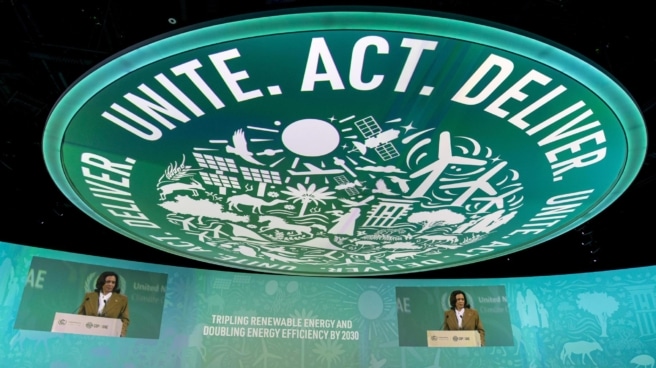

Kamala Harris speaks during the Dubai summit.
Today, 123 countries have signed the agreement. COP28 Declaration on Climate and Healthan initiative that puts health at the center of climate action and recognizes that emissions and pollution must be reduced to protect it, but makes no mention of the need to end their root causes – fossil fuels.
Declaration that such powers as USA, European Union or Japan but not the world’s two most populous countries, China and India, were supported by the presidency of the Dubai Climate Summit (COP28) in collaboration with the World Health Organization (WHO).
The COP28 Presidency recognizes that reducing the health impacts of climate change will require whole-of-society action, including “rapid, large-scale action to decarbonize energy systems to reduce emissions by at least 43% over the next 7 years.”
According to the same source, pollution is responsible for almost 9 million deaths each year and more than 189 million people are exposed to extreme events.
More renewable energy
In addition, a total of 116 countries committed to tripling their installed renewable energy capacity and doubling their rate of energy efficiency improvements by 2030 with the signing of the Agreement. Global Commitments to Renewable Energy and Energy Efficiency promoted by the President of the COP28 Dubai Climate Summit.
This would mean achieving 11,000 gigawatts of renewable capacity in less than 7 years and increasing the rate of energy efficiency improvements from 2 to 4% per year.
Signatories include the US, UK, Argentina, Brazil, Canada, Chile, Colombia, Japan, Mexico and the European Union, as well as member states Spain, France, Portugal and Italy. Representatives from China, India and Russia stand out among those absent.
These goals are in line with proposals advocated by the International Energy Agency and the International Renewable Energy Agency, supported by the European Union and the G20, a grouping of the world’s largest economies in terms of renewable energy and efficiency.
The EU will also defend at COP28 that achieving the goal of limiting global warming to 1.5 degrees requires a global phase-out of fossil fuels and peak consumption as early as this decade.
To this end, it advocates ending the use of all fossil fuels (coal, oil and gas) in the energy sector by 2050, since competitive technologies already exist to replace them, sources familiar with the community’s position explained to EFE.
For other uses of fossil fuels, such as aviation or shipping, the EU advocates that they should continue to be used only when accompanied by CO2 capture and storage systems (such as synthetic fuels).
Source: El Independiente